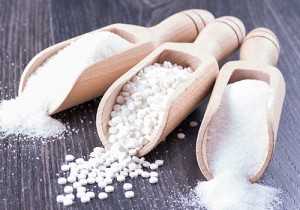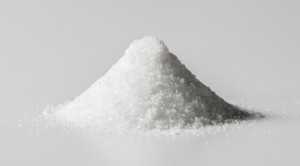Sugar alcohols are fast becoming popular alternatives to sugar, they are healthier, are low GI and we love to use them in raw food recipes for that reason!
Kinda cool, when you think about it, that some types of sugars can actually be good for you! Lets take a quick look at what sugar alcohols are and what the health benefits can be.
Sugar alcohols (or “polyols”) are types of sweet carbohydrates, used widely as “sweeteners”. As the name implies, they are like hybrids of sugar molecules and alcohol molecules. Despite the “alcohol” part of the name, they do not contain any ethanol, the part that can get you drunk!
Several of them are found naturally in fruits and vegetables, however most are produced industrially, where they are processed from other sugars, such as the glucose in corn starch. As the picture shows, it’s hard to tell them apart!
Because they mimic the chemical structure of sugars, they are also able to activate the sweet taste receptors on our tongue. They still do contain calories, just a whole lot less than refined sugar.
Common Sugar Alcohols:
The most common are Xylitol, Erythritol, Sorbitol, and Maltitol.
Xylitol is the most common and well researched, and is a popular ingredient in sugar-free gum, mints and toothpaste. It’s nearly as sweet as sugar, but has 40% less calories. It’s also the most readily available in Australia. It also has a low GI (12) so great for anyone with blood sugar issues or candida as Xylitol is generally well tolerated. It looks like sugar and tastes likes sugar!
Erythritol is a product of fermenting the glucose in corn starch, and with 70% of the sweetness of sugar, it has only 5% of the calories. A little harder to get in Australia but you can order online, and again looks and behaves like sugar so great for use in baking, sweets and desserts, and does not have the potential digestive distress that some other sugar alcohols do.
Sorbitol (made from corn syrup) has a cool taste and is widely used in sugar-free food and drink. It also occurs naturally in stone fruits and berries. Consumed in large quantities, it can cause digestive distress. Available in powder or liquid form it does have 50% of relative sweetness to sugar so you will need to use larger amounts.
Maltitol is processed from maltose, and occurs naturally in some fruits and vegetables. Maltitol has 50 to 70 percent of the relative sweetness of sugar, which means more must be used to equal the sweetness of sugar. Maltitol stays in the intestines for a long period of time and can lead to bloating and diarrhoea.
Stevia is not a sugar alcohol, but a plant based sweetener -the sweetener itself comes from either the whole leaf or from the compound rebaudioside-A that is found in it, and has a GI of 0, so perfect for those with candida or blood sugar issues.
The taste is very sweet, but slightly different from regular sugar. Just 3 drops of liquid stevia is equal to one teaspoon of sugar. We love to use this in raw food in combination with the sugar alcohols as this means we use less of the ingredient but also keeps the food as low GI as possible.
Health Benefits
Most sugar alcohols have little to no effect on blood sugar and insulin levels, with the exception of maltitol, and have a low GI – between 0 for Erythritol, just over 10 for Xylitol and in the mid 30’s for Maltitol. If you have diabetes, look out for the sugar alcohols that have the lowest GI, ideally 0 or around the 10 mark.
It’s long been known that sugar can wreak havoc on our teeth, so it’s good news that the most common benefit is an improvement in dental health. They’re a popular ingredient in many gums and toothpastes, and actually protect against tooth decay. There’s also some indication that gut, bone and skin health stand to benefit from sugar alcohols.
Here at The Raw Food Kitchen we like to use Xylitol to replace sugar in desserts and treats as it adds bulk to recipes and looks just like sugar! In smoothies or raw milkshakes (made with nut milk),a liquid sweetener like Stevia works really well – a tiny drop goes a very long way!
We have been working with sugar alcohols and healthy sugar replacements for a while here at The Raw Food Kitchen and we have found that using sugar alcohols and low GI sweeteners in our recipes are generally well tolerated by most people and to get any kind of digestive upset you have to consume such large amounts it would nearly be impossible to do!
However if you have issues with absorbing fructose you may find you get some sort of digestive upset after consuming. As with anything, check in with your body after eating and see how you feel. Does this food make you feel good or bad? Are you suffering from bloating or discomfort? You may want to explore trying other sugar alcohols or Stevia if this is the case.
Tell us what you think!
Do you use sugar substitutes regularly? Have you noticed any changes to your health and well-being? Do you find your body tolerates them well? Do you find they work well in recipes – what are your favourites and why? We’d love to hear from you! Leave your comments in the section below.
New to Raw?
If you would like to find out how we incorporate these amazing low GI healthy sugar alternatives into our raw recipes (and how you can too) we have a great workshop to help you out! Getting Started with Raw will give you a fantastic introduction into a whole new world of tastes, specialty superfoods, sugar alcohols and low GI sweeteners!
We’d love to see you there!
Also allow us to support you and support each other by joining one of our raw food diet plans.
Love from The Raw Food Kitchen Team.




